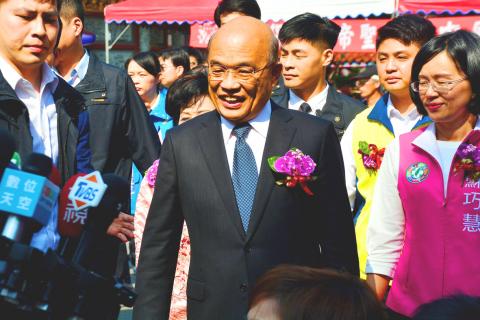Beijing has been manipulating public opinion to advance its expansionist ambitions in Taiwan, Premier Su Tseng-chang (蘇貞昌) said yesterday, calling on the public not to become unwitting tools of Chinese propaganda as an apparent Beijing-directed social media influence campaign causes concern.
The Mainland Affairs Council in a statement on Friday said it had asked the government to investigate whether China’s reported effort to recruit pro-China content creators in Taiwan contravenes Taiwanese laws.
The council’s statement was perceived to be a response to reports that job advertisements have appeared on Facebook that seek Taiwanese applicants willing to promote a Taiwanese detente or unification with China.

Photo: CNA
“The Internet is as much a weapon of the Chinese government as the Chinese warships and fighter jets circling the nation,” Su said yesterday.
“China is paying people from all classes of Taiwanese society and utilizing the Internet to manufacture disinformation and fake news, which create divisions and demoralization that aid Beijing’s ambitions of annexing Taiwan,” he said.
While government agencies have been ordered to take precautions against China’s influence operations, members of the public are called upon to exercise their best judgement when consuming information, he said.
The Legislative Yuan’s Organic Laws and Statutes Bureau has raised concerns that a bill being drafted by the Executive Yuan to regulate false reporting could infringe on freedom of the press, he said.
“We hope the media can regulate itself, but we have witnessed disconcerting developments, which the public has also condemned,” he said. “Both self-regulation and laws are needed for effective regulation.”
The Executive Yuan is mulling another amendment to the Criminal Code that would punish people who help spread false information, Cabinet spokeswoman Kolas Yotaka said yesterday.
“We cannot let outside forces take advantage of Taiwan’s freedom while harming our democracy,” Kolas said, adding that the government would continue to combat false reporting aimed at causing social unrest.
Separately yesterday, Taoyuan City Councilor Wang Hao-yu (王浩宇) of the Green Party said that a business entity had offered him a seven-digit sum to sell a Facebook community page for Jhongli District (中壢) that he administers.
The entity is apparently based in China and its offer is probably connected to the general elections next year, he said, adding that the business seemed to have calculated the asking price based on the number of posts and comments generated.
“I am not a sellout and I will not allow our priceless freedom of speech to fall into the hands of the information warfare operatives across the [Taiwan] Strait,” he said.
The National Security Bureau has been asked to launch an investigation into the identity of the would be buyer, he said.
Additional reporting by CNA

ALIGNED THINKING: Taiwan and Japan have a mutual interest in trade, culture and engineering, and can work together for stability, Cho Jung-tai said Taiwan and Japan are two like-minded countries willing to work together to form a “safety barrier” in the Indo-Pacific region, Premier Cho Jung-tai (卓榮泰) yesterday said at the opening ceremony of the 35th Taiwan-Japan Modern Engineering and Technology Symposium in Taipei. Taiwan and Japan are close geographically and closer emotionally, he added. Citing the overflowing of a barrier lake in the Mataian River (馬太鞍溪) in September, Cho said the submersible water level sensors given by Japan during the disaster helped Taiwan monitor the lake’s water levels more accurately. Japan also provided a lot of vaccines early in the outbreak of the COVID-19 pandemic,

Kaohsiung Mayor Chen Chi-mai (陳其邁) on Monday announced light shows and themed traffic lights to welcome fans of South Korean pop group Twice to the port city. The group is to play Kaohsiung on Saturday as part of its “This Is For” world tour. It would be the group’s first performance in Taiwan since its debut 10 years ago. The all-female group consists of five South Koreans, three Japanese and Tainan’s Chou Tzu-yu (周子瑜), the first Taiwan-born and raised member of a South Korean girl group. To promote the group’s arrival, the city has been holding a series of events, including a pop-up

TEMPORAL/SPIRITUAL: Beijing’s claim that the next Buddhist leader must come from China is a heavy-handed political maneuver that will fall flat-faced, experts said China’s requirement that the Dalai Lama’s reincarnation to be born in China and approved by Beijing has drawn criticism, with experts at a forum in Taipei yesterday saying that if Beijing were to put forth its own Dalai Lama, the person would not be recognized by the Tibetan Buddhist community. The experts made a remarks at the two-day forum hosted by the Tibet Religious Foundation of His Holiness the Dalai Lama titled: “The Snow Land Forum: Finding Common Ground on Tibet.” China says it has the right to determine the Dalai Lama’s reincarnation, as it claims sovereignty over Tibet since ancient times,

Temperatures in some parts of Taiwan are expected to fall sharply to lows of 15°C later this week as seasonal northeasterly winds strengthen, the Central Weather Administration (CWA) said today. It is to be the strongest cold wave to affect northern Taiwan this autumn, while Chiayi County in the southwest and some parts of central Taiwan are likely to also see lower temperatures due to radiational cooling, which occurs under conditions of clear skies, light winds and dry weather, the CWA said. Across Taiwan, temperatures are to fall gradually this week, dropping to 15°C to 16°C in the early hours of Wednesday